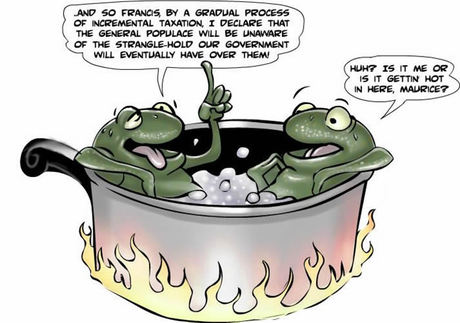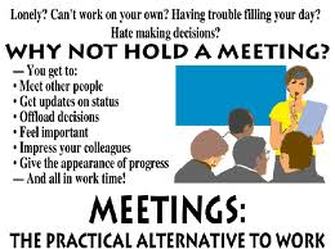|
Meetings! Bloody Meetings! Be Mindful.
|
|
Much has been written and researched about mindfulness in the workplace – much of which is about the skills and disciplines linked to quietening the mind in the noise and bustle of organisational life. In this article, I am using “mindfulness” to refer to the act of being thoughtful in your decisions, as opposed to acting on automatic pilot.Over time, all organisations develop habits and norms that its people take on without thinking – and we only notice when it has become too much. It’s a bit like the boiled frog analogy – if you put a frog into hot water, it will jump straight out; but if you put it into cold water and slowly heat the water to boiling point, the frog will die because by the time it realises how hot the water is, it’s too late!The time we spend in meetings is a classic case in point. I don’t have a single client who does not complain about spending an intolerable amount of time in meetings. When I ask for more information about the types of meetings they go to, it turns out that in very many instances:
|
|
It seems that the only thing we check before clicking “Accept” on our meeting invitations is that there isn’t a clash. This isn’t nearly mindful enough. In fact, this is bordering on the positively mindless!Let’s start by considering the purpose of meetings. I can think of only three important reasons to call a meeting. The first is to bring together multiple minds so that they can be collectively applied to a matter (or matters) of consequence to the business, in order to take decisions that are in the best interests of the business. In pursuit of this we:
|
It seems that the only thing we check before clicking “Accept” on our meeting invitations is that there isn’t a clash. This isn’t nearly mindful enough. In fact, this is bordering on the positively mindless!
Let’s start by considering the purpose of meetings. I can think of only three important reasons to call a meeting. The first is to bring together multiple minds so that they can be collectively applied to a matter (or matters) of consequence to the business, in order to take decisions that are in the best interests of the business. In pursuit of this we
The second important reason to call a meeting is so that meeting participants can account to each other. This means reporting on progress against objectives, identification of problems and the actions taken to solve them, brainstorming of more intractable problems in order to find solutions, and agreement on a way forward (this is your classic monthly review meeting).
The third reason why calling a meeting might be relevant is to explain complex information to interested stakeholders so that they can ask questions that address their concerns and put their minds at rest.
Can you think of any other reasons to call a meeting that do not somehow fit with the three conditions I’ve provided?
So if there are only three legitimate reasons to call a meeting, what are the legitimate reasons for you to attend a meeting? The only reasons to attend a meeting are:
1. You can make a contribution:
1.1 Either this contribution will be to the discussion, and will have the effect of moving the matter forward in a meaningful way;
1.2 Or this contribution will be to the growth and development of some or all of the meeting participants.
2. You will gain useful information and insight that you can use in the course of your work.
So how can you be more mindful about the meetings you call and attend?
Let’s start by considering the purpose of meetings. I can think of only three important reasons to call a meeting. The first is to bring together multiple minds so that they can be collectively applied to a matter (or matters) of consequence to the business, in order to take decisions that are in the best interests of the business. In pursuit of this we
- Consider information so that we can answer pertinent questions;
- Generate options for action;
- Make decisions on action to be taken.
The second important reason to call a meeting is so that meeting participants can account to each other. This means reporting on progress against objectives, identification of problems and the actions taken to solve them, brainstorming of more intractable problems in order to find solutions, and agreement on a way forward (this is your classic monthly review meeting).
The third reason why calling a meeting might be relevant is to explain complex information to interested stakeholders so that they can ask questions that address their concerns and put their minds at rest.
Can you think of any other reasons to call a meeting that do not somehow fit with the three conditions I’ve provided?
So if there are only three legitimate reasons to call a meeting, what are the legitimate reasons for you to attend a meeting? The only reasons to attend a meeting are:
1. You can make a contribution:
1.1 Either this contribution will be to the discussion, and will have the effect of moving the matter forward in a meaningful way;
1.2 Or this contribution will be to the growth and development of some or all of the meeting participants.
2. You will gain useful information and insight that you can use in the course of your work.
So how can you be more mindful about the meetings you call and attend?
|
Before you call a meeting, ask yourself:
1. What is the purpose of the meeting? Do I wish to: - Solve problems and make decisions? - Share information? - Open up a discussion and clarify any concerns? - Create an opportunity for colleagues to account to one another and move a project forward? - Can this purpose be achieved without calling multiple people into the same room (or virtual meeting)? If you just want to share information and discussion is unnecessary, send an email, or record and upload an intranet podcast or videoclip. - What is my agenda? Avoid writing your agenda as bullet points (e.g. HR; Finance; Marketing; etc.). Even if you will move through your meeting by division or department, phrase each agenda item as questions to be answered. For example: |
HR:
- Allocate times to your agenda items to ensure that you can finish on time. Put lower priority items lower down the agenda so that you can hold them
over to a later meeting if you run late.
- Who can make a contribution to the meeting? This is the people who will contribute to the thinking and the discussion. Invite them with the
agenda. Make sure they have all background documents and that they know what they need to prepare.
- Who can benefit from attending the meeting – because they will learn something that will be useful in their work or their development? Invite
them to the meeting with the agenda, and tell them why you have invited them.
Before accepting a meeting invitation, ask yourself:
So step one in being more mindful at work is think about what meetings you call, attend and accept.
- What progress has been made on the wage negotiations?
- What recommendations do you have for finalising this by the end of the quarter?
- What support do you need to be able to do this?
- Marketing: Which advertising agency do you wish to appoint and how have you selected them?
- What are the results of the market research into customer responses to the Pelagro product?
- What does this mean for the launch of the product? Discussion to agree on the launch project plan.
- Allocate times to your agenda items to ensure that you can finish on time. Put lower priority items lower down the agenda so that you can hold them
over to a later meeting if you run late.
- Who can make a contribution to the meeting? This is the people who will contribute to the thinking and the discussion. Invite them with the
agenda. Make sure they have all background documents and that they know what they need to prepare.
- Who can benefit from attending the meeting – because they will learn something that will be useful in their work or their development? Invite
them to the meeting with the agenda, and tell them why you have invited them.
Before accepting a meeting invitation, ask yourself:
- What is the agenda? No agenda, no accept!
- Can I contribute to the discussion? Can I benefit from attending? Will I learn something useful? No contribution/no benefit? No accept!
- Do I need to be there the whole time? If not, just be available for the relevant time and advise the meeting host.
- Did I have something else planned for that time slot? (e.g. were you planning to write a project proposal at that time? Or some other appointment
with yourself?) Reschedule it! Don’t just double book and bump the appointment with yourself.
So step one in being more mindful at work is think about what meetings you call, attend and accept.






